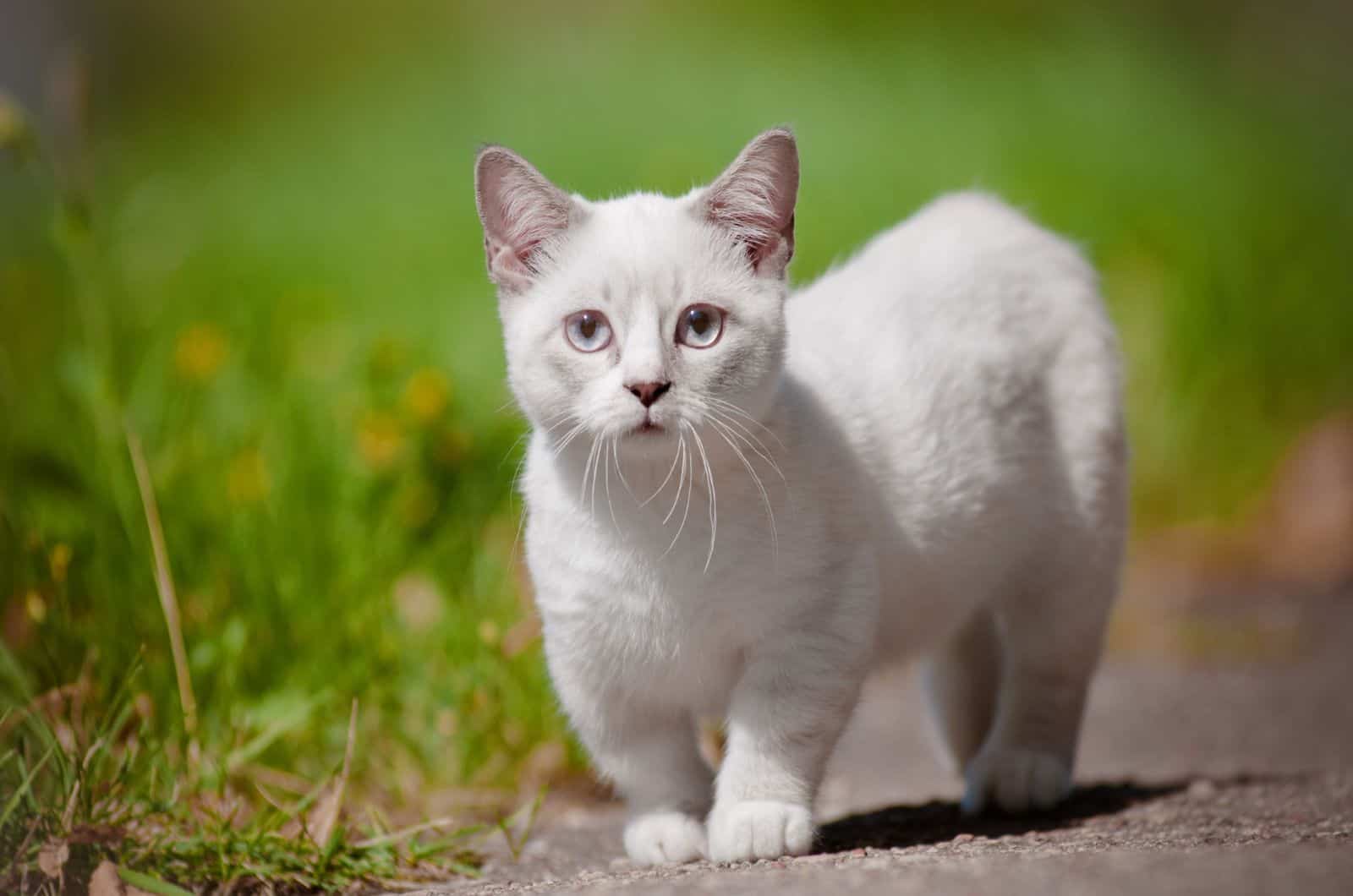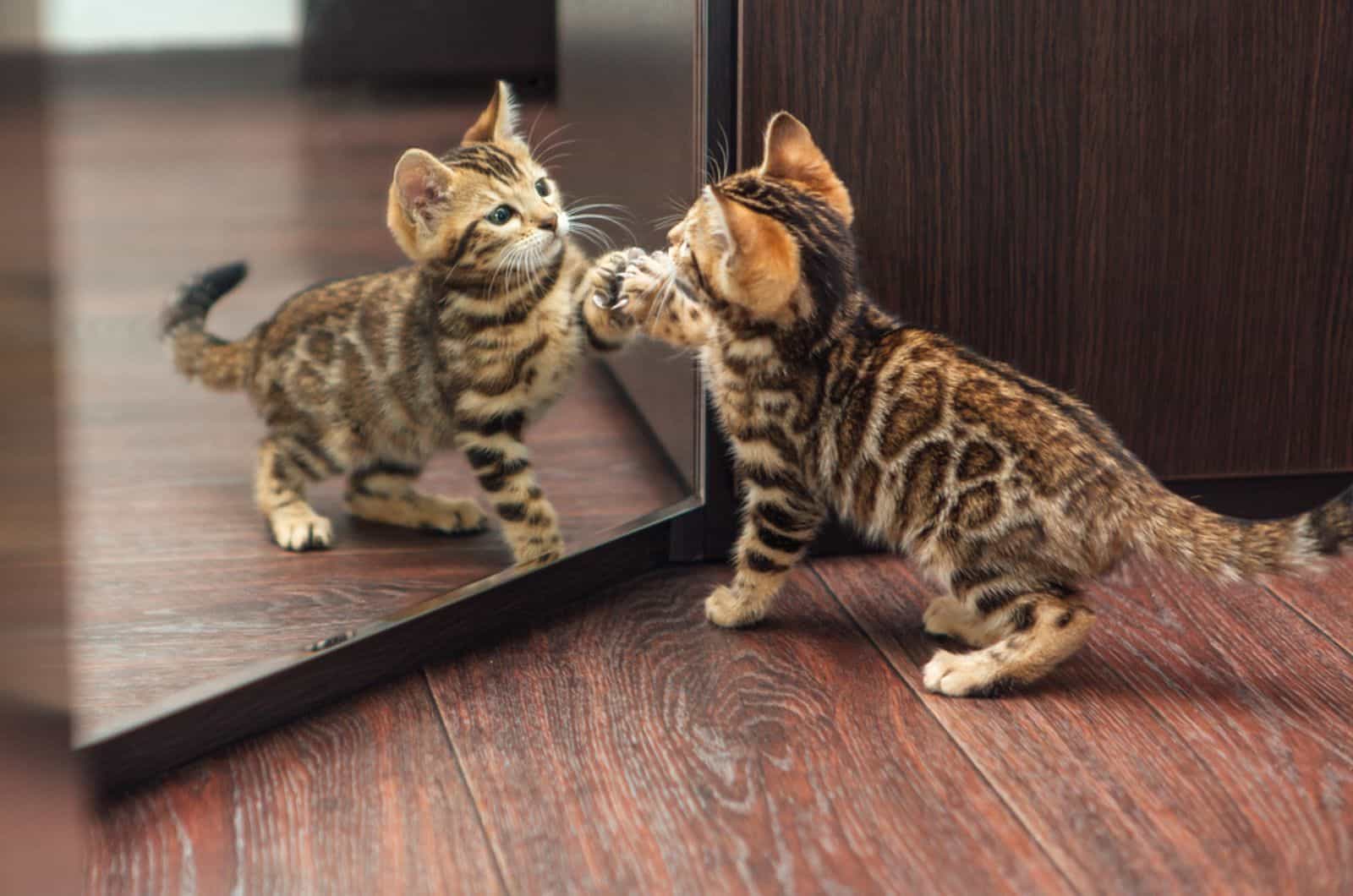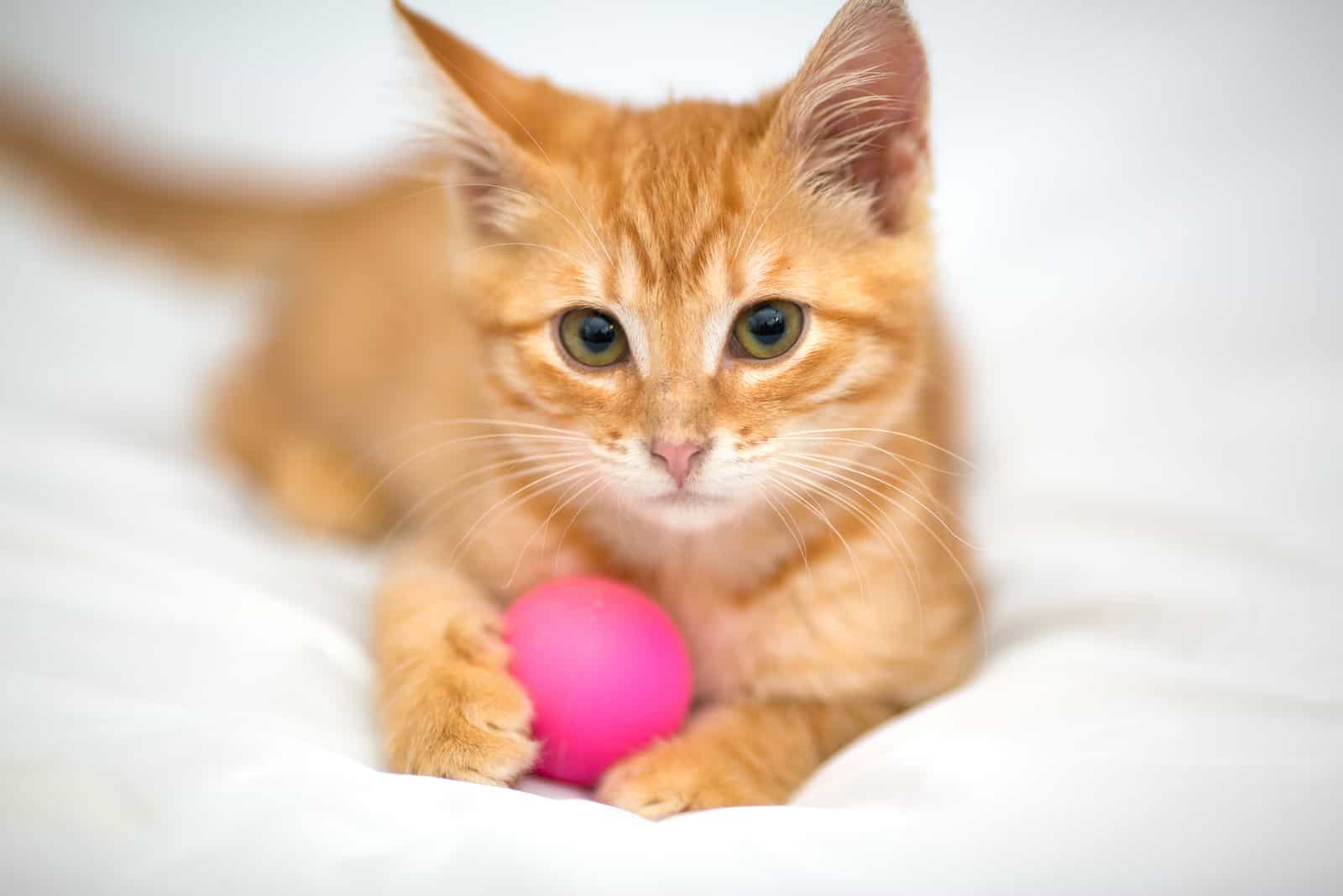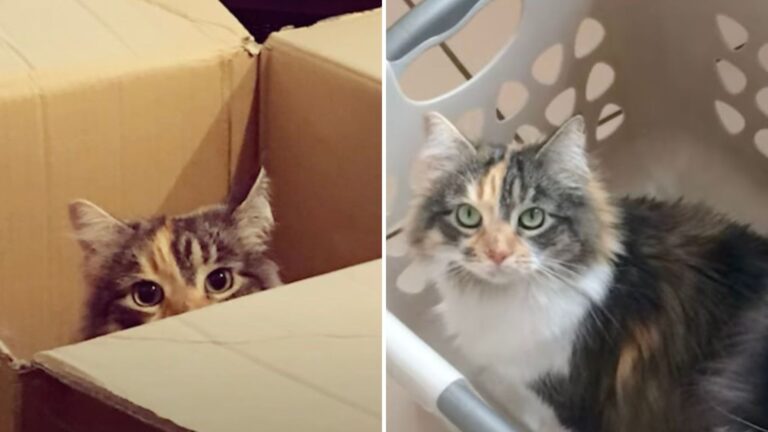When Do Kittens Start Walking? A Must-Know Kitten-Care Fact

While having kittens around makes every cat owner feel an inexplicable sense of joy, caring for these kittens carries a lot of responsibility. Because of this, it’s essential to have a clear understanding of what to anticipate at each developmental milestone.
Out of many kitten-care questions you might be having, one surely is When do kittens start walking?
Cats take their first steps around the beginning of their third week of life, but they start confidently walking and running around the fifth week.
Most people follow a rule of thumb: a kitten should be walking by the 28th day. However, some kittens might develop faster and learn how to walk even sooner than that, while some kittens are in no rush and start walking a bit later on.
To learn more details about when kittens learn how to move, walk and run and when some other vital milestones happen, I suggest you continue reading!
When Do Kittens Start Walking?

Newborn kittens completely depend on their mothers for everything, including food, safety, and movement.
You’ve probably seen a mother cat carrying her kittens, but when are kittens capable of moving around by themselves?
Let’s look at how kittens learn to walk and run, week by week.
| Stage of life | How kittens move |
| Week 1 | Crawling |
| Week 2 | Crawling and trying to have their first steps |
| Week 3 | Having their first steps and walking wobbly |
| Week 4 | Confidently walking, even running |
| Week 5 | Confidently walking and running |
| Week 6 | Walking, running, pouncing, and jumping |
As you can see, kittens start crawling around at one to two weeks of age.
Around the third week, kittens begin to find their feet and attempt to walk, but their balance isn’t perfect. As they gain coordination, you’ll notice that they stagger all over the place. Although this stage is adorable, it ends quickly.
By the fourth week, most cats can stand and move easily. They’ll continue to be a little clumsy until they reach full cathood, but that won’t compare to how unsteady they were when they first started walking.
Kittens at five weeks will start to run around more. Plenty of activity will be going on, and you’ll find them quite busy playing with their littermates!
Can Kittens Walk At 2 Weeks Old?
At two weeks old, kittens are still unable to walk. But they will surely try to! At two weeks old, your kittens will probably try to take their first steps, and most of them will succeed in doing so!
Look at this cute 13-day-old kitten taking his first steps!
While they start out wobbly and unsure, as balance improves during the third and fourth week, they become increasingly confident.
At three weeks old, most kittens will start to walk a bit; although wobbly, they are trying! You should see them at four weeks old – they will be professionals in walking!
How Do Kittens Move Around Before Their Third Week?
Although a kitten may not begin walking until the third week, this does not imply that they are entirely immobile before then. They are curious and eager to explore their surroundings, even as newly born kittens.
Like infants crawl, they move across the floor using their paws. They might try to travel the world, but their mother prevents them from going very far. If necessary, momma cat will pick the kitten up by the nape of its neck and nudge them back into position.
How Do A Kitten’s Walking Habits Change? Going Through The Development Phases

Kitten development happens so fast, and before you even know it, your tiny ball of fur is a playful troublemaker running around your home. Because of this, I recommend every cat owner enjoys their kittens’ developmental milestones, which will happen only once!
Here, we will look more closely into some essential developmental milestones kittens reach before they’re eight weeks old, as well as how their movement improves with age!
Week 1 – Sleeping, Growing & Crawling
A kitten’s first week is stressful for most cat owners, but do not worry – everything will be okay!
All kittens are born with closed eyes and will spend most of their time sleeping, eating, and growing. During their first week, they typically double their birth weight.
Despite being unable to walk, they move around (crawl) using their tiny paws and legs. They can only travel short distances by dragging or pushing themselves where they want to go.
Since they are blind and deaf, their only senses are smell and touch, which they use to find warmth and comfort (usually within their mother’s cuddle). A kitten’s first 48 hours are crucial for developing maternal antibodies through nursing.
Week 2 – Opening Their Eyes & Taking Their First Steps
The second week of the kitten’s life is famous because that is when most kittens open their eyes! The world will initially appear quite blurry to them, and you will notice that all kittens will have blue eyes!
During their second week of life, they are still in their “dragging” stage of movement! Towards the end of the second week, some brave kittens will attempt to take their first steps, and you can be proud of them when they do so!
At this point, they will begin to develop a sense of smell. It is also safe to start deworming treatment for the kittens!
Week 3 – Walking Wobbly & Growing Baby Teeth

Around the same week that kittens’ deciduous teeth emerge, they’ll be more on their feet. Approximately three weeks after birth, kittens start to walk. They will not be the best at it, but they don’t give up on it!
As they gain strength, they can start standing for short periods of time and moving a little bit at a time.
Three-week-old kittens will also begin growing baby teeth (permanent teeth come in around 3–4 months)!
Week 4 – Weaning, Litter Box Training & Walking Confidently
A lot of important milestones are reached this week!
4-week old kittens start to walk faster and farther than before, though some are still a bit wobbly.
They gain self-assurance and a desire to discover their surroundings. If you haven’t already, now is an excellent time to begin kitten-proofing your house.
As the kitten’s age approaches week 4, I’m sure pet parents have checked their new kitten checklist and bought litter boxes and kitten food!
This is the time when the kittens start the weaning process. Therefore, this is when kittens typically begin eating moistened solid food.
You can also begin litter box training by providing kitten-friendly litter boxes! Kittens require assistance urinating or defecating until they are four weeks old. You can now expect kittens to poop without their mother’s help!
Week 5 – Running And Making Trouble With Their Littermates
There will be a lot of activity in the kittens’ fifth week of life, and you’ll see them quite occupied playing with their littermates – pouncing, running around, playing, and exploring everything around them.
At five weeks old, kittens can run in their characteristic sprinting manner and confidently walk on their own.
It’s a great time to start socializing kittens because they are curious and playful by five weeks old and comfortable with their newfound mobility.
Interact with the kittens through play and cuddling, expose them to other people and animals, and allow them to explore their surroundings!
Week 6 – Socializing And Being Pro-Runners

Things become simpler for kitten caregivers at six weeks old. The kittens should be using the litter box and will be able to groom themselves, and one another, to strengthen their sibling bonds.
Make sure to discipline the kittens – let them know that human hands are not for biting or scratching as you start teaching them how to play. This will prevent kittens from growing into undisciplined adult cats.
Kittens can run well at this age and are also very playful and active.
Six-week-old kittens should eat wet food flavored with kitten kibble. You can begin to separate the kibble from the wet food, but be sure to do so gradually.
Extra tip: Six weeks is the standard age for the kitten to receive its first FVRCP vaccine.
Week 7 – True Eye Color Emerging And Climbing Cat Trees
At week seven, you might wonder: Do kittens’ eyes change colors? The kitten’s eye color will change at this stage, and their “adult eye color” will start to show.
Kittens will become highly active at seven weeks old, and there will be less time for sleep and more time for playing. Kittens can run, climb cat trees, and bravely jump off furniture at this age.
Introduce the kittens to scratching posts if you haven’t already, and trim their claws for the first time.
Fun fact: All of their baby teeth will be visible at this age!
Week 8 – Being Independent And Ready To Be Spayed Or Neutered
Kittens that are eight weeks old will be active and independent. The development of their coordination and agility will be almost complete.
The eyes will entirely change to their mature green, yellow, brown, or blue hue. Additionally, they will have finished milk feeding and resemble adult cats.
When they reach a weight of two pounds, they are ready for spaying or neutering. Spaying or neutering can help prevent unwanted litters, protect against serious health issues, and may reduce many behavioral problems brought on by the instinct to reproduce.
Suggested: How Much Should A 10 Week Old Kitten Eat? An Owner’s Guide
What If My Kitten Does Not Start Walking “On Time”?

A kitten taking its first steps, starting to walk, and walking normally are very important milestones in a kitten’s development. Therefore, if they are not reached, that could indicate an underlying health issue.
If you notice the symptoms below, I urge you to take your kitten(s) to the vet;
• Shaking while walking
• Not using its hind legs
• Progressing slowly
• Walking strangely
• Not walking at all
Numerous causes for these issues exist, such as nerve damage, tumor development, vestibular disease, or some congenital disorder. Therefore, going to the vet is the best thing you can do for your kitten’s health.
What If My Kitten Suddenly Stops Walking?
If your kitten suddenly stops walking, it could be a symptom of fading kitten syndrome.
A group of symptoms associated with illness that kittens up to eight weeks old exhibit is referred to as “fading kitten syndrome.”
Other symptoms are:
• Weakness
• Lethargy
• Low body temperature
• Loss of appetite
• Losing weight
• Excessive vocalization
• Not breathing properly
• Pale gums
• Vomiting and diarrhea
Take your kitten to the vet right away if it isn’t able to walk or stand, is extremely cold, or exhibits any other signs of the symptoms listed above. Additionally, ensure the kitten is fed a sufficient, high-quality diet, and kept warm and well-hydrated.
Related: How Long Can Kittens Go Without Food? Everything You Need To Know!
FAQ

Should A 4 Week Old Kitten Be Walking?
Four-week-old kittens will confidently explore and gain the coordination necessary to walk, run, and even play. So the answer is yes, a four-week-old kitten should be walking (although maybe a little shaky).
What Should You Do If The Kitten Is Not Using Its Hind Legs?
Please take your cat to the vet as soon as you can. If your cat is not using one or both hind legs, is not moving at all or is crying in pain, that is a medical emergency.
When Can You Start Holding The Kittens?
If possible, wait until the kittens are at least two weeks old before handling them. Up until this age, the mother cat will be their primary caregiver.
When Does A Kitten Start To Play?
Kittens begin playing around three to four weeks of age, and playing is a crucial component of socialization. However, they will be the most active during their 7th-14th weeks, when they have developed great physical coordination and social skills.
How Long Does It Take For A Kitten To Develop Its Full Adult Teeth?
At around ten weeks to 6 months of age, kittens start growing their teeth, starting with the primary incisors being replaced by their permanent counterparts. Every one of the kitten’s 30 adult teeth will have come in by the time it is 6-7 months old on average.
How Many Weeks Does A Kitten Need To Be Fully Grown?
At around 12 months, kittens typically reach their peak growth rate. Therefore, a kitten at 12 weeks old is not considered a kitten anymore but a young adult cat!
However, the maturation process for larger breeds, like Maine Coons, can take up to two years.
Final Thoughts
In the first year of a kitten’s life, many changes happen. It’s incredible to think that a meowing kitten that fits in the palm of your hand can develop into an adult cat in just a year. If you’re eager to see them run around your house, It’s understandable you’re wondering when do kittens start walking?
While newborns can move around immediately, kittens don’t take their first steps until they are about three weeks old. By the time they are about four weeks old, they are walking, though somewhat shakily. At week 5, they are confidently walking and even running!
If you notice your kitties are not walking properly or not walking at all, please consult your veterinarian, as this can be a sign of an underlying health issue.
I hope this article was informative and that your new kittens will bring much joy into your household!
Related Articles:
4-Month-Old Kittens Size And Growth Changes – Kitten To Adult
Where Should My Kitten Sleep On The First Night?
Can Kittens See In The Dark – Get To Know Your Kitten’s Eyes
Like this post? Share or pin it for later!







